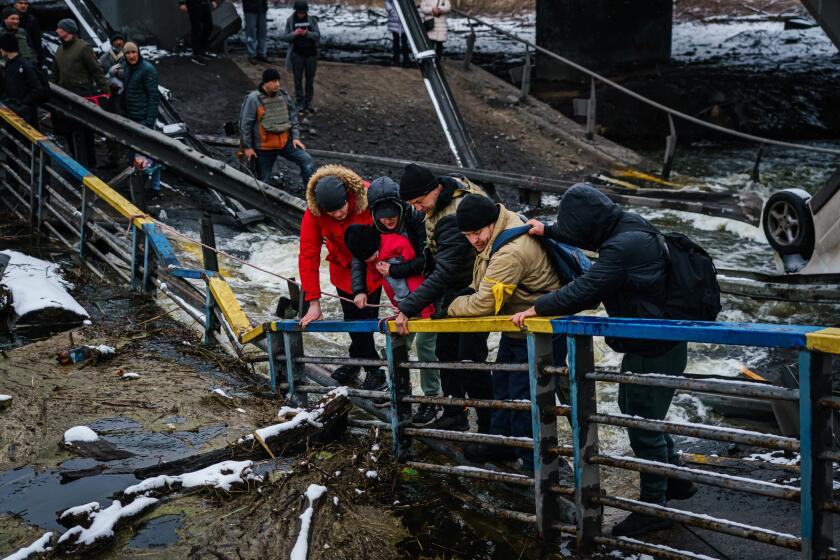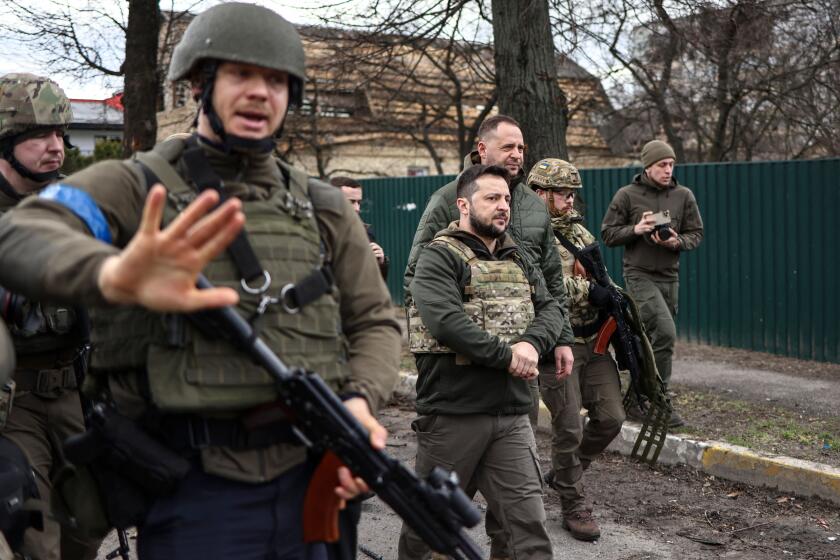U.N. General Assembly votes to demand that Russia stop war in Ukraine

The U.N. General Assembly has voted to demand that Russia stop its offensive in Ukraine and withdraw all troops.
UNITED NATIONS — The U.N. General Assembly voted at an emergency special session Wednesday to demand an immediate halt to Moscow’s offensive against Ukraine and withdrawal of all Russian troops, with very strong support from the world organization’s 193 member nations that sparked sustained applause.
The vote on the resolution, titled “Aggression against Ukraine,” was 141 to 5 with 35 abstentions.
Russia got support for its appeal to vote against the resolution only from Belarus, Syria, North Korea and Eritrea, a powerful indication of the international isolation that Russian President Vladimir Putin faces for invading his country’s smaller neighbor. Emphasizing that isolation was a major goal of the resolution’s supporters.
The abstentions included China and India, as expected, but also some surprises from usual Russian allies Cuba and Nicaragua. And the United Arab Emirates, which abstained on last Friday’s similar Security Council resolution, voted “yes.”
Speaking to the General Assembly on Tuesday, Cuban Ambassador Pedro Luis Cuesta blamed the crisis on what he said is the U.S. determination to keep expanding NATO toward Russia’s borders as well as the delivery of modern weapons to Ukraine, ignoring Russia’s concerns for its own security. He said the resolution “suffers from lack of balance” and doesn’t begin to address the concerns of both parties, or “the responsibility of those who took aggressive actions which precipitated the escalation of this conflict.”
Unlike Security Council resolutions, General Assembly resolutions are not legally binding, but they do have clout in reflecting international opinion. Under special emergency session rules, a resolution needs approval of two-thirds of those countries voting, and abstentions don’t count.
After Russia vetoed a similar resolution in the Security Council on Feb. 25, Ukraine and its supporters won approval for an emergency special session — the first since 1997 — to try to spotlight opposition to Russia’s invasion.
The resolution states that Russia’s military operations in Ukraine “are on a scale that the international community has not seen in Europe in decades and that urgent action is needed to save this generation from the scourge of war.” It “urges the immediate peaceful resolution of the conflict” and reaffirms the assembly’s commitment “to the sovereignty, independence, unity and territorial integrity of Ukraine within its internationally recognized borders.”
Before the vote, Ukrainian Ambassador Sergiy Kyslytsya said of Russian forces: “They have come to the Ukrainian soil, not only to kill some of us ... they have come to deprive Ukraine of the very right to exist,” adding that “the crimes are so barbaric that it is difficult to comprehend.”
Russian Ambassador Vassily Nebenzia then urged U.N. members to vote against the resolution, alleging that Western nations exerted “unprecedented pressure” with “open and cynical threats” to get support for the measure.
“This document will not allow us to end military activities. On the contrary, it could embolden Kyiv radicals and nationalists to continue to determine the policy of their country at any price,” Nebenzia warned.
The Russian invasion in Ukraine has set its sights on Kyiv. But first it has to go through this town, where Russian soldiers lay dead, and people flee to safety across a river on a broken bridge.
“Your refusal to support today’s draft resolution is a vote for a peaceful Ukraine” that would not “be managed from the outside,” he said. “This was the aim of our special military operation, which the sponsors of this resolution tried to present as aggression.”
The resolution also deplores “the involvement of Belarus in this unlawful use of force against Ukraine,” a characterization that Belarusian Ambassador Valentin Rybakov flatly rejected in his speech to the assembly shortly before the vote.
He said his country’s only involvement in the conflict was organizing talks, due to continue Thursday, between Russia and Ukraine. Belarus has taken Russia’s side in the conflict, with Rybakov saying the resolution reflected “double standards” toward Russia and the West.
A woman reacts as she stands in front of a house burning after being shelled in the city of Irpin.
U.N. Secretary-General Antonio Guterres told reporters immediately after the vote: “The message of the General Assembly is loud and clear: End hostilities in Ukraine — now. Silence the guns — now. Open the door to dialogue and diplomacy — now.”
“We don’t have a moment to lose,” he said. “The brutal effects of the conflict are plain to see. … It threatens to get much, much worse.”
U.S. Ambassador Linda Thomas-Greenfield followed, saying “the world has spoken with a clear, united voice” and the vote “demonstrated that Russia is isolated and alone, and that the costs will keep rising until Russia relents.”
She urged all countries to “keep the momentum going,” do everything possible to help the Ukrainian people, hold Russia accountable and “match our strong words with strong actions.”
In his explanation of China’s abstention, Ambassador Zhang Jun used more emotional language than at previous U.N. meetings, citing “dramatic changes of the situation in Ukraine” and calling what is unfolding “heart-wrenching.” He reiterated Beijing’s support for the sovereignty and territorial integrity of all countries, and for the peaceful settlements of all disputes in line with the U.N. Charter.
“The top priority right now is to ease the situation on the ground as much as possible, and prevent the situation from escalating or even getting out of control,” Zhang said.
The assembly resolution, co-sponsored by 96 countries, deplored Russia’s “aggression” against Ukraine “in the strongest terms” and demanded an immediate halt to Moscow’s use of force and the immediate, complete and unconditional withdrawal of all Russian forces from Ukraine’s internationally recognized borders.
The measure also called on Russia to reverse a decision to recognize two separatist parts of eastern Ukraine as independent.
During more than two days of meetings preceding the vote, there were speeches from about 120 countries.
From the tiny Pacific island nation of Palau to Europe’s economic powerhouse Germany, country after country lashed out at Russia’s invasion of Ukraine and urged support for the U.N. resolution during their speeches. There were only a few that supported Russia and some that took no position, such as Suriname and South Africa, which urged compromise and diplomacy to find a lasting resolution to the crisis. In Wednesday’s vote, Suriname voted “yes” and South Africa abstained.
The resolution’s co-sponsors included Afghanistan, where the Taliban ousted the elected government last August, and Myanmar, where the military overthrew the elected government led by Aung San Suu Kyi on Feb. 1, 2021. But neither the Taliban nor Myanmar’s military government have gained U.N. recognition, so that support came from representatives of their previous governments.
More to Read
Sign up for Essential California
The most important California stories and recommendations in your inbox every morning.
You may occasionally receive promotional content from the Los Angeles Times.












